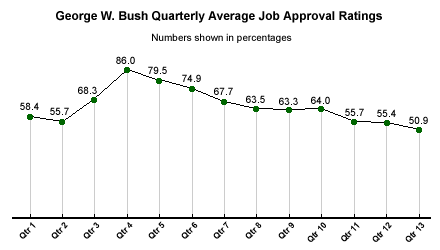April 19 marks the end of George W. Bush's 13th quarter in office as president. In recent months, Bush's job approval ratings have been among the lowest of his presidency, including term-low ratings of 49% in Jan. 29-Feb. 1 and March 5-7 Gallup Polls*. For the quarter that began on Jan. 20, Bush averaged a 50.9% job approval rating. This marks the lowest quarterly average of his presidency to date, nearly five percentage points below his previous low mark.

Bush's quarterly approval averages have been trending downward over the past few years. He had averaged an unprecedented 86% job approval rating in the first several months after the Sept. 11 terrorist attacks. His quarterly approval rating average stayed above 70% through the 6th quarter of his presidency, and above 60% through the 10th quarter of his presidency.
However, Bush's 13th-quarter average is not substantially worse than other presidents' averages at this point in their terms. The one exception is Dwight Eisenhower, who had a 73% approval rating average at this point in his presidency.
Quarterly Job Approval Averages, 13th Quarter in Office
|
President |
Dates of 13th quarter in office |
Approval rating |
Number of measurements |
|
% |
|||
|
Eisenhower |
Jan 20-Apr 19 1956 |
73.2 |
5 |
|
Johnson |
Oct 20 1966-Jan 19 1967 |
46.0 |
4 |
|
Nixon |
Jan 20-Apr 19 1972 |
53.7 |
3 |
|
Carter |
Jan 20-Apr 19 1980 |
47.7 |
6 |
|
Reagan |
Jan 20-Apr 19 1984 |
54.5 |
4 |
|
George H.W. Bush |
Jan 20-Apr 19 1992 |
41.8 |
9 |
|
Clinton |
Jan 20-Apr 19 1996 |
53.0 |
5 |
|
George W. Bush |
Jan 20-Apr 19 2004 |
50.9 |
8 |
It is clear that by this stage in the presidency, a president's approval rating is predictive of his chances of being re-elected (aside from Lyndon Johnson, all other presidents at this stage were seeking a second term in office). Richard Nixon, Ronald Reagan, and Bill Clinton all had approval rating averages above 50% at this stage in their presidencies, and all were re-elected. On the other hand, Jimmy Carter and the elder George Bush's approval rating averages in their 13th quarters in office were below 50%. Both of these men lost their re-election bids.
The current president's quarterly approval average falls in between the range of what successful and unsuccessful incumbents have had. So, while an approval rating above 50% is a positive sign for Bush, the fact that other presidents' averages were at least 53% makes it appear less certain that Bush is well-positioned for re-election.
The quarterly average ranks as the 146th best out of 227 presidential quarters for which Gallup has data, stretching back to the Truman presidency. That places this quarter in the 35th percentile of all presidential quarters.
Bush still ranks as one of the most positively rated presidents in recent history. For his presidency to date, his average job approval rating is 64.9%. Only John Kennedy (70.1%) and Eisenhower (65.0%) had better average job approval ratings than Bush.
*Bush's quarterly average is taken from the results of eight Gallup Polls conducted between Jan. 20 and April 19, 2004. Each poll consisted of interviews with approximately 1,000 randomly selected national adults, each with a margin of error of ±3 percentage points.
